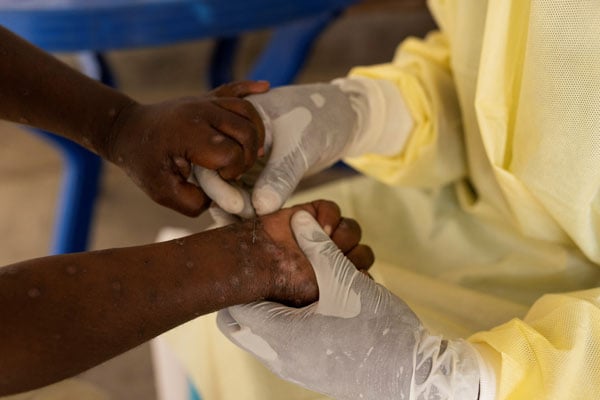Nutrition critical in Mpox recovery

Christian Musema, a laboratory nurse, takes a sample from a child declared a suspected case of Mpox - an infectious disease caused by the monkeypox virus that sparks off a painful rash, enlarged lymph nodes and fever; at the treatment centre in Munigi, following Mpox cases in Nyiragongo territory near Goma, North Kivu province, Democratic Republic of the Congo July 19, 2024. PHOTO/ REUTERS
What you need to know:
- Zinc is vital for immune cell function and wound healing. and is found in meat, shellfish, legumes, and seeds.
- Plan meals ahead of time to ensure a steady supply of nutritious foods.
Mpox (formally known as monkeypox) is a viral zoonosis caused by the Mpox virus, presenting with symptoms such as fever, rash, and swollen lymph nodes.
Recovery from Mpox can be supported significantly through nutrition and diet, which play critical roles in enhancing immune function, reducing inflammation, and ensuring overall well-being. This article explores the significance of various nutrients and dietary strategies in promoting recovery for patients with Mpox.
1. Immune System Support. Vitamins and Minerals: Essential for a robust immune response, vitamins and minerals help in combating infections and reducing the severity of symptoms.
Key nutrients include Vitamin A, C, D and Zinc.
Vitamin C that is found in citrus fruits, strawberries, and bell peppers, boosts the production of white blood cells and improves skin integrity, which is crucial during infection.
Vitamin A, important for maintaining mucosal barriers and enhancing immune function, can be found in liver, carrots, and sweet potatoes while Vitamin D modulates the immune response and can be obtained from sunlight exposure, fatty fish, and fortified dairy products.
Zinc is vital for immune cell function and wound healing. and is found in meat, shellfish, legumes, and seeds.
2. Anti-inflammatory properties
•Omega-3 Fatty Acids reduce inflammation and are found in fatty fish like salmon, flaxseeds, g nuts, pumpkin seeds, and walnuts. Chronic inflammation can exacerbate symptoms and delay recovery, so incorporating omega-3s can help manage inflammation levels.
•Polyphenols, present in fruits, vegetables, tea, such as apples, berries, have antioxidant properties that reduce oxidative stress and inflammation.
3.Hydration
Adequate fluid intake is crucial during illness to prevent dehydration, especially if fever is present. Always spicy up water with herbal teas, ginger, lemon, bay leaves, turmeric, cinnamon to make your hydration tactful and interesting. Hydration supports bodily functions and helps flush out toxins.
4.Protein for tissue repair
Protein is essential for repairing damaged tissues and maintaining immune function. Sources include lean meats, poultry, fish, eggs, dairy products, legumes, and nuts. Adequate protein intake helps in the healing of skin lesions and overall recovery.
5.Digestive health
Maintaining a healthy gut flora is vital for a well-functioning immune system. Probiotics found in yogurt and fermented vegetables support gut health and can improve overall immunity.
A balanced diet rich in fibre from fruits, vegetables, and whole grains aids digestion and absorption of nutrients, remember a healthy eating plate consists of half a plate of vegetables and fruits, a quarter plate of carbohydrates, a quarter a plate of proteins.
A balanced diet ensures the body receives a comprehensive array of nutrients necessary for recovery. Emphasising a variety of fruits, vegetables, whole grains, and lean proteins ensures adequate intake of essential vitamins and minerals.
Also, patients may have a reduced appetite or increased metabolic rate due to fever. It’s important they consume sufficient calories to meet the body’s energy demands. Small, frequent meals that include nutrient-dense foods can help maintain energy levels and support recovery.
There is also a need to incorporate foods with anti-inflammatory properties that can help manage symptoms and speed up recovery. Examples include berries, nuts, olive oil, turmeric, and ginger.
Patients should avoid eating processed foods that are usually high in sugar, salt, and unhealthy fats can promote inflammation and hinder recovery. Focusing on whole, unprocessed foods helps in managing inflammation and supports overall health.
Other tips
Plan meals ahead of time to ensure a steady supply of nutritious foods. Include a variety of fruits and vegetables, whole grains, and protein sources to meet dietary needs, ensuring all food values at the same sitting.
Opt for cooking methods that preserve nutrients and reduce the intake of unhealthy fats, such as steaming, boiling and shallow frying.In cases where dietary intake may be insufficient, supplements can be considered. However, it is important to consult with a healthcare provider before starting any new supplements.
Adjust the diet based on the patient’s symptoms. For example, if gastrointestinal symptoms are present, easily digestible foods and clear liquids may be preferred as per recommendations by a nutritionist.
Therefore, by adopting a balanced and nutrient-rich diet, patients can enhance their overall health and well-being, contributing to a more effective and quicker recovery from Mpox.
Authored by Daniel Kamara, Clinical and community nutritionist at Bwindi Community Hospital . [email protected]




